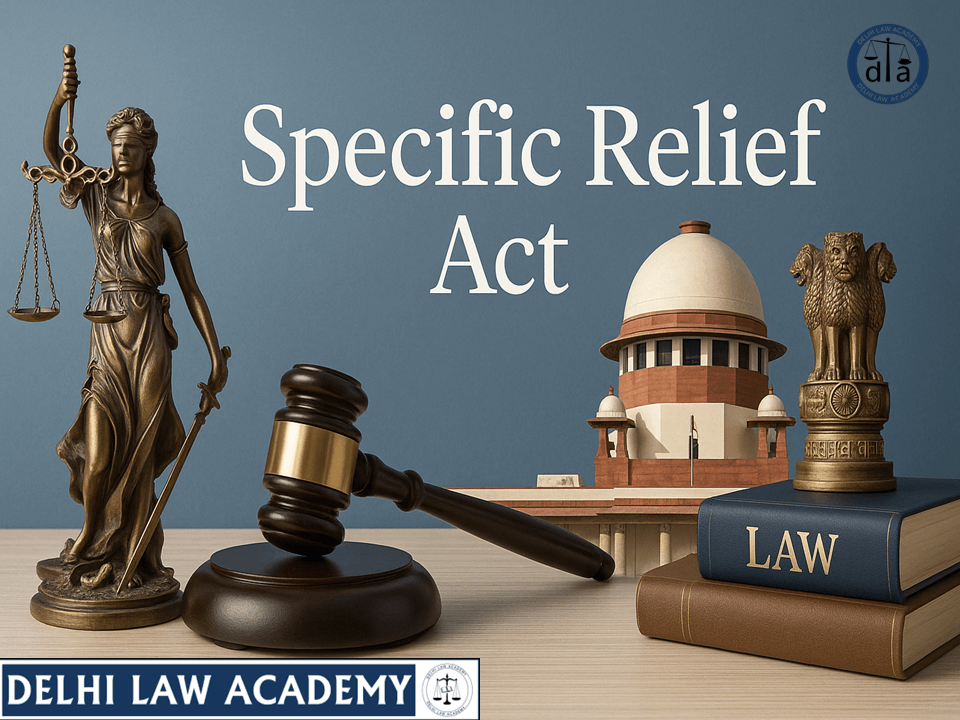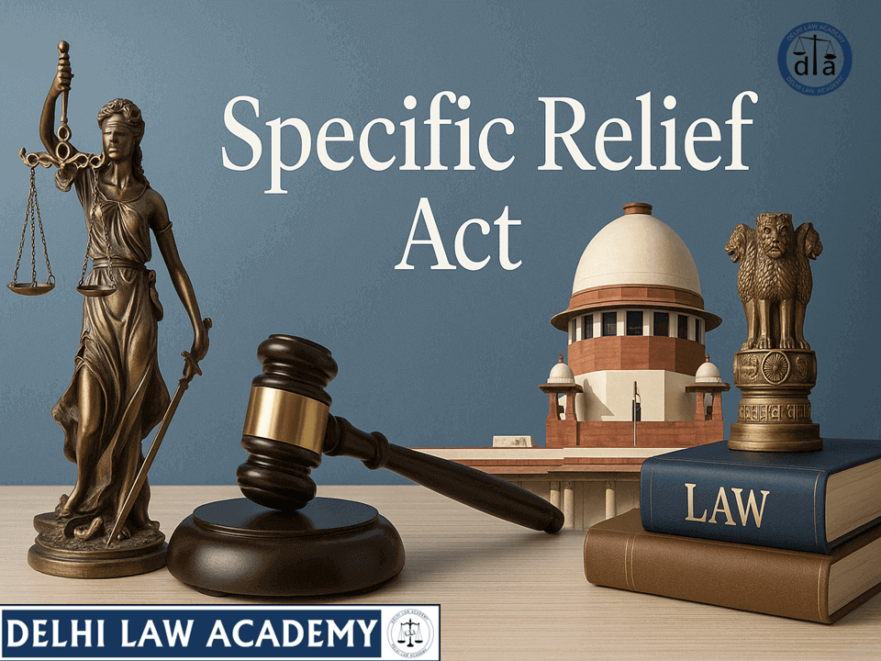
⚖️ SPECIFIC RELIEF ACT : PERPETUAL AND MANDATORY INJUNCTIONS ⚖️
📘 Topics
- Perpetual injunction when granted
- Scope of a suit for prohibitory injunction
- Prohibitory injunction relating to immovable property
- Mandatory injunctions
- Guidelines for grant of interlocutory mandatory injunctions
🧾 Supreme Court Judgments discussed:
🎯 Preparation for RJS, DJS, PCS (J) and Other Judicial Service Exams
SPECIFIC RELIEF ACT EXPLAINED
The Specific Relief Act is an important component of any and every Judicial Service exam in the country. Its thorough knowledge is a must for all aspirants of RJS, DJS, PCS (J) and every other Judicial Service exam. To help such aspirants, DELHI LAW ACADEMY JAIPUR has launched a series of study material modules on all important aspects of this important part of their syllabus.
📕 CHAPTER VIII – PERPETUAL INJUNCTIONS
Section 38(1): Perpetual injunction when granted
- Subject to other provisions of this Chapter
- A perpetual injunction may be granted to plaintiff
- to prevent breach of an obligation existing in his favor
- whether expressly or by implication
Section 38(2)
- When any such obligation arises from contract
- court shall be guided by rules and provisions contained in Chapter II
Section 38(3)
- When defendant invades or threatens to invade plaintiff’s right to or enjoyment of property, court may grant a perpetual injunction in the following cases:
- (a) where defendant is trustee of the property for the plaintiff
- (b) where there exists no standard for ascertaining the actual damage caused or likely to be caused by the invasion
- (c) where the invasion is such that compensation in money would not afford adequate relief
- (d) where injunction is necessary to prevent a multiplicity of judicial proceedings
📘 DLA Note on Section 38
Note 1: Scope of a suit for prohibitory injunction
The general principles as to when a mere suit for permanent injunction will lie, and when it is necessary to file a suit for declaration and/or possession with injunction as a consequential relief:
- Where a plaintiff is in lawful or peaceful possession of a property and such possession is interfered or threatened by the defendant, a suit for an injunction simpliciter will lie. A person has a right to protect his possession against any person who does not prove a better title by seeking a prohibitory injunction. But a person in wrongful possession is not entitled to an injunction against the rightful owner.
- Where the title of the plaintiff is not disputed, but he is not in possession, his remedy is to file a suit for possession and seek in addition, if necessary, an injunction. A person out of possession cannot seek the relief of injunction simpliciter, without claiming the relief of possession.
- Where the plaintiff is in possession, but his title to the property is in dispute, or under a cloud, or where the defendant asserts title thereto and there is also a threat of dispossession from defendant, the plaintiff will have to sue for declaration of title and the consequential relief of injunction. Where the title of plaintiff is under a cloud or in dispute and he is not in possession or not able to establish possession, necessarily the plaintiff will have to file a suit for declaration, possession and injunction.
Note 2: Prohibitory injunction relating to immovable property
- (a) Where a cloud is raised over plaintiff’s title and he does not have possession, a suit for declaration and possession, with or without a consequential injunction, is the remedy…
- (b) As a suit for injunction simpliciter is concerned only with possession, normally the issue of title will not be directly and substantially in issue…
- (c) But a finding on title cannot be recorded in a suit for injunction, unless there are necessary pleadings and appropriate issue regarding title…
- (d) Where there are necessary pleadings regarding title, and appropriate issue relating to title on which parties lead evidence, if the matter involved is simple and straight-forward, the court may decide upon the issue regarding title…
📙 MANDATORY INJUNCTIONS
Section 39: Mandatory injunctions
- When, to prevent breach of an obligation, it is necessary to compel performance of certain acts which court is capable of enforcing
- Court may in its discretion grant an injunction
- to prevent the breach complained of
- and also to compel performance of the requisite acts
⚖️ Guidelines for Grant of Interlocutory Mandatory Injunctions
- The courts can grant interlocutory mandatory injunction in certain special circumstances.
- The relief of interlocutory mandatory injunction is granted generally to preserve or restore the status quo…
- Generally stated, the guidelines are:
- The plaintiff has a strong case for trial…
- It is necessary to prevent irreparable or serious injury…
- The balance of convenience is in favour of the one seeking such relief.
- Being essentially an equitable relief, the grant or refusal… shall ultimately rest in the sound judicial discretion of the Court.
- In considering the question of interim mandatory injunction in a suit filed under section 44 of the Act, the Court has also to keep in mind the restriction on the rights of the transferee to joint possession under that section.
📚 Continue Your Specific Relief Act Preparation
Don’t stop here! Strengthen your knowledge of the SRA with our other fully solved tests:
📘 Free Study Material for Judiciary Aspirants!
Download our FREE study material prepared by Delhi Law Academy’s expert faculty.
💡 Frequently Asked Questions (FAQs) on Specific Relief Act – Perpetual & Mandatory Injunctions
A Perpetual Injunction is a permanent court order granted under Section 38 of the Specific Relief Act to prevent a person from breaching an obligation or invading another’s rights to property. It is granted after a full trial and permanently restrains the defendant from doing certain acts that would cause harm or loss to the plaintiff.
A Mandatory Injunction under Section 39 is granted when it is necessary to compel the defendant to perform certain acts to prevent the breach of an obligation. It directs positive action — for example, to restore possession or remove an obstruction — and is granted only when damages or prohibitory orders are not sufficient.
A Perpetual Injunction restrains a person from doing something permanently, while a Mandatory Injunction compels them to take certain actions to correct a breach. The former is preventive; the latter is corrective in nature. Both are governed by Sections 38 and 39 of the Specific Relief Act, 1963.
In Anathula Sudhakar v. P. Buchi Reddy [2008 SC], the Supreme Court clarified when a plaintiff can file a suit for injunction simpliciter and when a suit for declaration and possession is necessary. It held that if the plaintiff is in lawful possession, an injunction suit is maintainable; otherwise, a declaratory or possession suit is required depending on the circumstances.
According to Dorab Cawasji Warden v. Coomi Sorab Warden [1990 SC], courts grant interlocutory mandatory injunctions only in special cases. The plaintiff must have a strong case, show irreparable harm if relief is denied, and demonstrate that the balance of convenience lies in their favor. These are equitable and discretionary remedies.
Yes ✅. The Specific Relief Act forms a key part of the syllabus for RJS, DJS, PCS(J) and other Judicial Service exams. Topics such as perpetual injunctions, mandatory injunctions, and specific performance are frequently asked in both objective and descriptive papers. Aspirants should thoroughly study relevant sections and leading case laws.
Contact us
📍 Delhi Law Academy – Jaipur Branch
6C, Tower 2, Coaching Hub, Pratap Nagar, Jaipur – 302033
📞 Phone:
+91 9911916552
+91 8447285606
✉️ Email:
contactus@delhilawacademy.com

